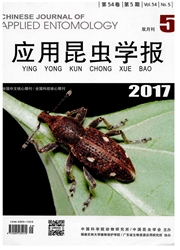

 中文摘要:
中文摘要:
为探明寄生蜂引起寄主寄生性去势的机制,本文选取携带不同多分DNA病毒(Polydnavirus,PDV)的2种内寄生蜂与共同寄主小菜蛾Plutella xylostella(L.)为寄生体系,研究不同虫龄小菜蛾被寄生后雄性生精细胞、精子束形态和精巢发育体积变化,系统比较寄生性去势程度和分别拥有2类PDV的寄生蜂在寄主精子发生和形成过程中的作用。结果表明:携带Bracovirus PDV的菜蛾盘绒茧蜂Cotesiave stalis(Haliday)或拥有Ichvovirus PDV的半闭弯尾姬蜂Diadegma semiclausum Hellén寄生对不同虫龄小菜蛾的精子发生和形成过程均产生明显的抑制作用,表现为不能产生精子束或精子束数量减少,但抑制程度以寄生低龄寄主时最明显。2种蜂寄生均能抑制小菜蛾精巢体积的增长,但对低龄寄主的抑制程度明显强于高龄寄主,寄生性去势程度取决于寄生时寄主虫龄。相比而言,寄生不同虫龄小菜蛾时,茧蜂引起小菜蛾寄生性去势的程度均强于姬蜂。
 英文摘要:
英文摘要:
The effects of the endoparasitoids Cotesia vestalis(Haliday) or Diadegma semiclausum Hellén on the germ cell and testicular growth of their host,Plutella xylostella(L.),were studied.C.vestalis and D.semiclausum carry two types of polydnaviruses.The results show that both C.vestalis bracovirus and D.semiclausum ichnovirus can inhibit host spermatogenesis and spermiogenesis;there were no,or only a few,sperm bundles in parasitized host testes.Inhibition of spermiogenesis was almost complete in hosts parasitized during early stages of development but was less severe in those parasitized at the 4th(final) stadium.Testicular growth of P.xylostella was also inhibited by parasitization;younger hosts developed smaller testes than those parasitized at the 4th stadium.The degree of castration therefore depends on the age at which the host is parasitized.C.vestalis had a significantly stronger suppressive effect on host germ cell and testicular growth than D.semiclausum.
 同期刊论文项目
同期刊论文项目
 同项目期刊论文
同项目期刊论文
 期刊信息
期刊信息
